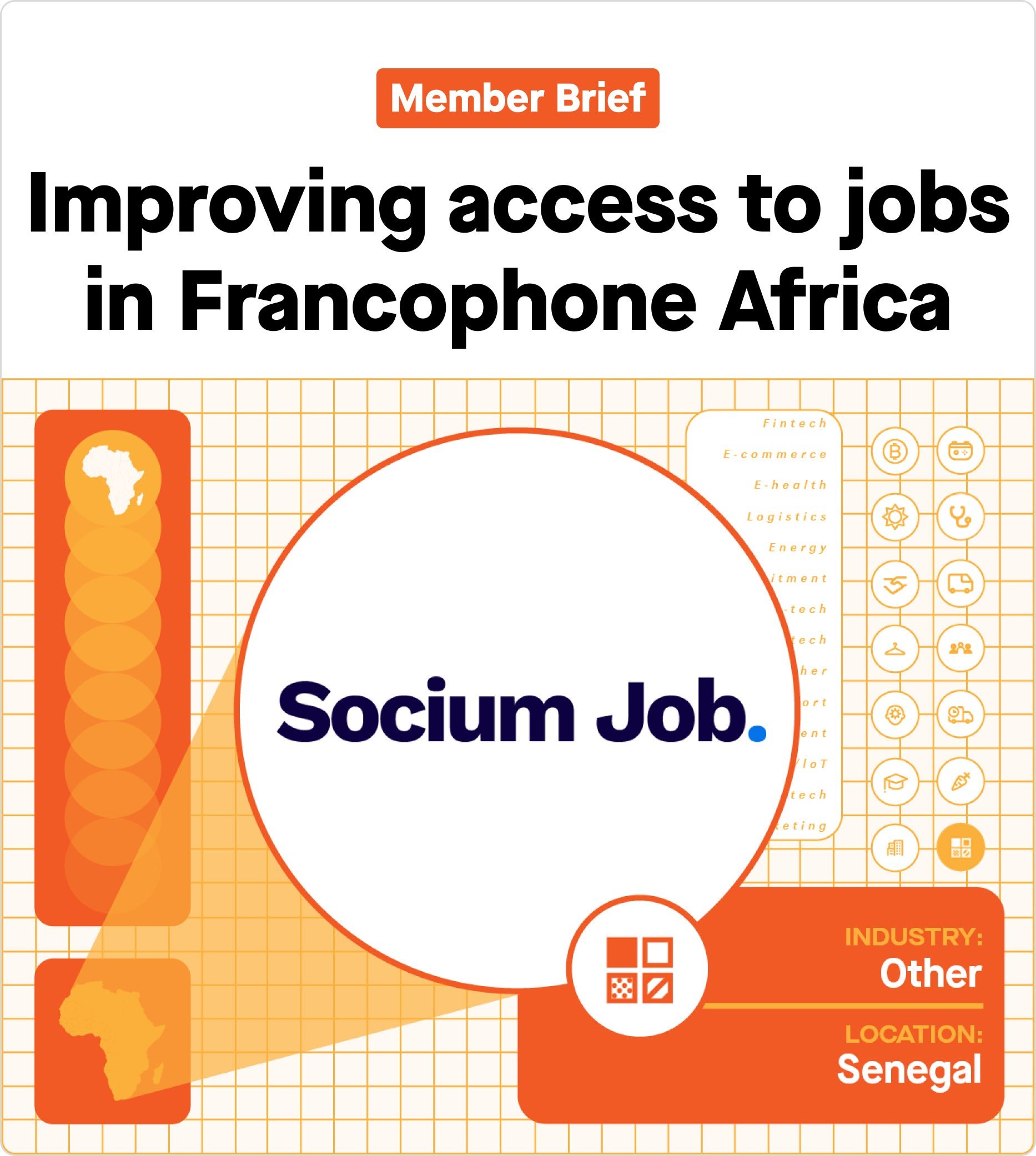✦ Improving access to jobs in Francophone Africa
Matching jobs to job-seekers

Hi Quartz Africa Members,
Economies in Francophone Africa are growing fast, and industries like tech, agri-business, trade, manufacturing, retail, and logistics all need new talent.
In Côte d’Ivoire, for example, the unemployment rate fell from 7.2% in 2012 to 3.5% in 2021. The drop is consistent with steady economic growth recorded over a decade. Before covid-19 hit in 2020, Côte d’Ivoire had grown its economy at an annual average rate of 8% since 2012. The pandemic slowed growth in the country to 1.8% in 2020, before it rebounded to 7% in 2021.
In Senegal, total unemployment declined from 10.4% in 2011 to 3.4% in 2021, according to the International Labour Organization (ILO). The economy grew by more than 6% per year between 2014 and 2018. Mali has also seen its unemployment decline over the past decade.
Growth in these economies has been largely driven by stable exports of raw commodities such as crude oil, gold, cocoa beans, natural rubber and cotton and robust domestic demand as well as, in some cases, increased public investment to fill infrastructural gaps (pdf.)
In Côte d’Ivoire, where 350,000-400,000 young people join the working-age population each year, the highest number of formal jobs created in a year (pdf) has only hovered around 40,000. Self-employment (agricultural and non-agricultural) accounts for over 80% of employment in the country. Wage employment accounted for just 19.4% of employment in 2015.
More high-paying jobs are being created on the back of private sector-driven initiatives to diversify agricultural production, boost value addition, and grow the tech and manufacturing sectors. Foreign direct investment is also growing. Companies looking to gain a foothold in these markets are competing to attract and retain the best talent. There also exists a growing number of Africans in the diaspora that are keen on returning for work that suits their skill-sets and matches their ambitions in cities such as Dakar and Abidjan.
Not surprisingly, a number of startups are trying to plug this talent gap, improving access to job opportunities while enabling companies to tap into a large pool of skilled employees.
The Cheat Sheet
💡The Opportunity: With companies in Francophone Africa increasingly demanding highly skilled employees, startups can help connect job-seekers in Africa and elsewhere to opportunities.
🤔The Challenge: Newspapers and word-of-mouth remain dominant as a source for job vacancies, compared to digital platforms. English speakers might also be unable to access opportunities in these Francophone countries due to the language barrier.
🗺️The Roadmap: By offering experiences that cater to the needs of both job-seekers and employers in Francophone Africa, startups can help feed vibrant job markets.
💰The Stakeholders: Private companies, government agencies, educational institutions, startups, and investors.
3.4%: Unemployment rate in Senegal in 2021, down from 10.4% in 2011
1.48 billion: In dollars, net foreign direct investment inflows to Senegal in 2020
27%: Share of women who are unemployed in the labor force in Côte d’Ivoire, compared to only 19.3% of men
80%: Self-employment as a share of all employment in Côte d’Ivoire
Case Study
Startup:Socium Job
HQ: Dakar, Senegal
Operating in: Côte d’Ivoire, Senegal, Mali, and Burkina Faso
Founder: Samba Lo
Between 2017 and 2021, Samba Lo, who’d studied engineering and mathematics in France, worked for organizations such as Deloitte, Goldman Sachs and Rothschild & Co. But Lo always wanted to make an impact back home in Senegal.
In Sep. 2021, Lo founded Socium Job, headquartered in Dakar. The pandemic’s impact still lingered. For Lo, this was the perfect time to roll out his platform, because the world was rethinking its approach to work and hiring, while normalizing practices such as remote work.
Socium positions itself as a tool for companies expanding into the Francophone Africa market to tap into a pool of talented, highly skilled employees in the region and in the diaspora. Socium only works with companies with at least 30 employees.
Among the companies using the platform to find new talent is CSS, the agro-industrial giant, which describes itself as Senegal’s largest private employer, with over 8,000 employees. Others include Cote d’Ivoire’s national investment bank Banque Nationale d’Investissement (BNI) and Orange Mali.
Socium’s approach leans heavily on content and technology. Companies using Socium’s platform prepare video showcases to offer prospective employees a glimpse into their operations and culture, in addition to publishing details of the role. These can include videos of conversations with executives, a look at their premises, or insights into their values. The videos are designed to feature prominently in the jobs display and application process on the platform.
Companies, on the other hand, benefit from Socium’s candidate pool and Applicant Tracking System (ATS).
According to Lo, it is important for employers to sell themselves to prospective employees. Job-seekers today are more discerning, and there is high competition for top talent among organizations in Francophone Africa. Those in the diaspora interested in returning to work in the region are also quite keen on getting a clear look at the opportunities and companies before jumping in.
On Socium, Lo said, “you will not see the job as the first thing. You will see the company. And below it is a video to show you what the company is all about.”
Lo further argues that Socium bridges a gap between large firms that often claim to be unable to find skilled employees in the region and talented workers who maintain that they are unable to find opportunities that suit their skills and credentials.
At present, Africans in the diaspora make up 20% of job candidates using Socium. The platform’s biggest competitor remains newspapers and word-of-mouth networks. Lo claims that fewer than 3% of job offers in west Africa are posted online.
Socium revealed in Aug. 2022 that it had raised $1 million to fund its growth across the region. Socium is currently present in Senegal, Côte d’Ivoire, Mali, and Burkina Faso. Lo says that Socium is focused first on deploying its solution across Francophone Africa, backed by a strong sales team, so as to build awareness and improve its technology. It also plans to roll out more innovative digital HR products.
In Conversation With

📋On what skills are in demand today in Francophone Africa:
“We’re seeing more and more companies hiring for digital profiles. There are more roles for software engineers and designers.”
💻On the growth of remote work:
“Recruiters are very open now to the idea of remote work. It is easier for digital profiles. We have jobs in more than five countries in Africa. A software engineer for example can be anywhere.”
🧳On Diaspora talent applying for roles in Africa:
“Diaspora talent is increasingly looking to move back to Africa…20% of our candidates on Socium are in the diaspora. In Africa, you have more and more nice (job) positions.”
Jobtech Deals to Watch
Meaningful Gigs, a D.C.-based startup, in March 2022 raised a $6 million funding round. The startup connects freelance designers in Africa with remote work opportunities in the US.
Kenyan influencer marketing platform, Wowzi, in December 2021 raised $2 million to expand its presence in the region. The platform allows young Africans to monetize their social media pages by endorsing specific brands.
Careers startup Fuzu in December 2021 closed a $3.86 million Series A funding round and aims to expand beyond Kenya where it was launched in 2015. The platform incorporates recruitment, career development resources, and partnerships with companies.
This member brief was prepared by Martin Siele while listening to Wanjapi and more songs by Unco Jing Jong (Kenya). Have an incredibly productive, fun week!
—Martin Siele, Nairobi-based Quartz contributor
One 😲 thing
Although approximately 12 million young people (pdf) enter the job market in Africa every year, only 3 million formal jobs are created per year. Over 80% (pdf) of the workforce is active in the informal sector.